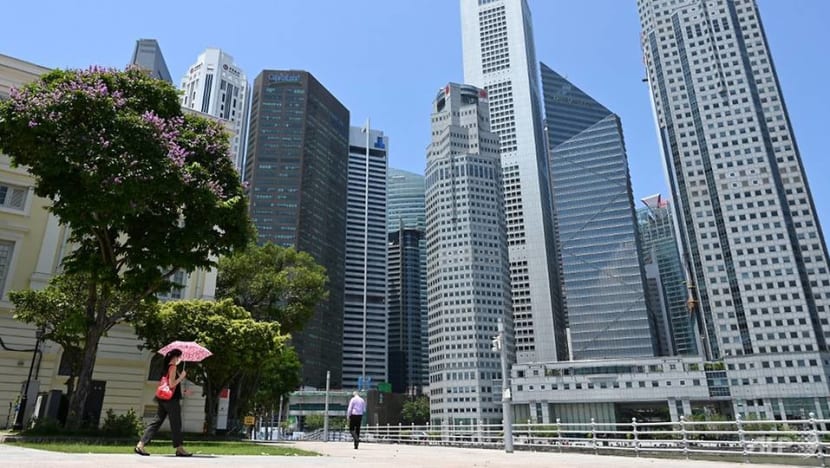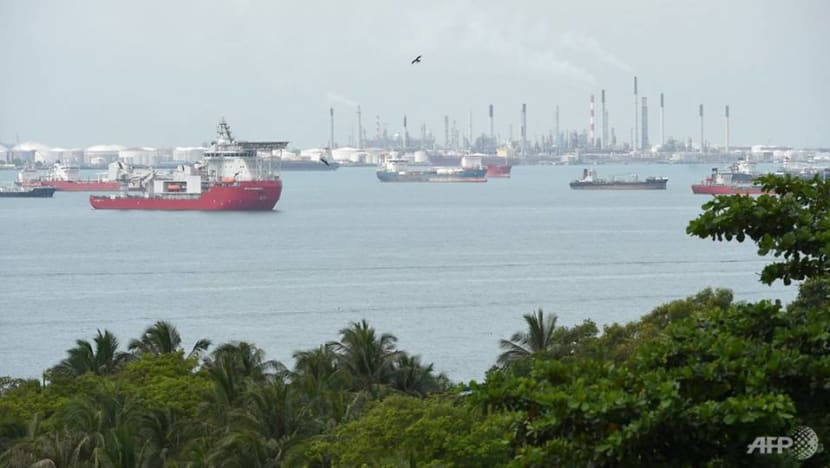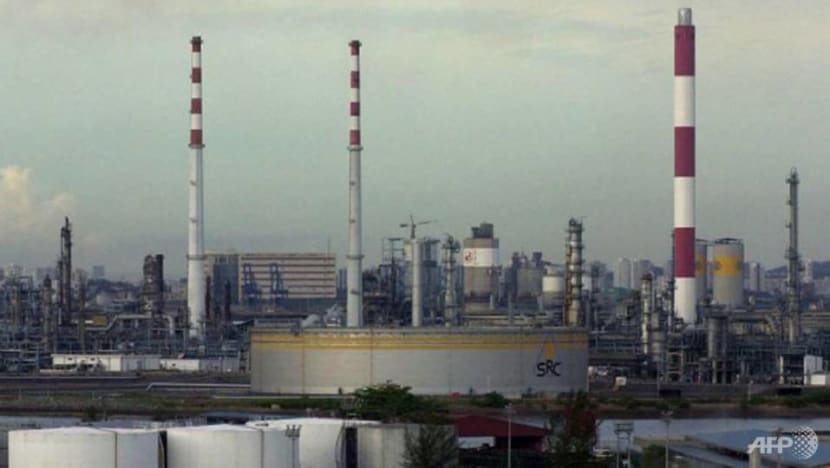commentary Commentary
Commentary: The global minimum corporate tax rate is coming our way and will change how Singapore attracts MNCs
A more realistic global minimum corporate tax rate of 15 per cent may bring it closer to global acceptance and soften its negative impact on Singapore, but it would still require the country to rethink incentives for large MNCs, says NUS Business School’s Assoc Prof Simon Poh.

A woman walks along a promenade at the Raffles Place financial business district in Singapore on Apr 20, 2021. (Photo: AFP/Roslan Rahman)
SINGAPORE: Less than two months after first proposing a 21 per cent global minimum corporate tax rate, on May 20, the US Secretary of the Treasury Janet Yellen floated the idea of a lower rate of 15 per cent.
She emphasised, however, that this was a floor rate and that a higher rate was still being contemplated and negotiated.
This more realistic rate is likely to gain increased support from other countries and build on momentum on a growing consensus for a global minimum corporate tax rate.
This announcement comes on the back of ongoing discussions under the OECD project on taxation of the digital economy, colloquially known as the Base Erosion and Profit Shifting (BEPS) 2.0, aimed at combatting tax-planning strategies used by some multinational corporations (MNCs) to avoid taxes.
COURTING INTERNATIONAL SUPPORT
France and Germany, already early supporters of the initially proposed 21 per cent rate, have been quick to endorse the latest US move as well, hailing it as a “good compromise” and a “big progress”.
The move comes before a meeting of the G7 countries in London next month where the new 15 per cent rate could see more support.
READ: Commentary: US presidents are growing more powerful – but nobody’s complaining
Not everyone has warmed up to the idea though. The initial 21 per cent rate had faced strong resistance from low-tax European countries like Ireland from the time the idea was mooted.
At home, the Republicans are expected to oppose the Biden administration’s tax proposals, whether it is the watered-down global minimum rate of 15 per cent or the proposed increase in the domestic US corporate tax rate to 28 per cent.
Admittedly, it was clever politics on the part of the US to attempt to first gain support from the international community on the global minimum rate in order to increase its chance of success on its domestic tax plan.
However, to gain acceptance, its proposed 28 per cent domestic corporate tax rate may also have to be reduced, for example, to 25 per cent to match UK’s proposed rate from 2023.

In an earlier commentary, I argued that although the initially proposed US global minimum tax of 21 per cent would likely encounter strong opposition from other countries, these talks would ignite a new momentum towards agreement on the consensus-based global minimum tax proposed by OECD under Pillar Two of BEPS 2.0 regarding taxing large MNCs.
With the compromised stance by the US, an agreement by the end of 2021 is looking highly possible now, given the small gap between 15 per cent and the 10 to 12.5 per cent that the OECD discussions are hovering over.
UNDERMINING SINGAPORE’S COMPETITIVE TAX REGIME
Over in Singapore, as I have previously explained, regardless of what this global minimum rate eventually is, Singapore’s corporate tax revenue base will be affected.
READ: Commentary: COVID-19 has forced the big boys of Singapore business to restructure. Who's next?
Should this significantly reduced minimum rate of 15 per cent be passed, the impact on Singapore will be somewhat reduced, but it will still be substantial.
Even though Singapore’s headline corporate tax rate is 17 per cent, the effective tax rate of many companies in Singapore could be lower than this rate and possibly even lower than 15 per cent.
Besides some privileged sectors such as financial, maritime and global trading companies that enjoy preferential tax rates when qualifying conditions are met, gains derived by companies from the disposal of certain assets such as equities are ordinarily not taxable in Singapore if they are held for long-term investment.

The net result could be that what is not taxable in Singapore may trigger a “top-up tax” to the extent that profits of group companies are taxed in Singapore at an effective tax rate below the global minimum rate of, say 15 per cent.
Effectively, Singapore, like other countries, could be relinquishing its taxing rights to a foreign parent jurisdiction under the global minimum tax proposal.
READ: Commentary: The great US tax rebalancing is long overdue
This in turn undermines Singapore’s competitive tax regime by neutralising some of its most prominent tax factors that have attracted global investors for many years – the availability of tax incentives and the absence of a capital gains tax regime.
SINGAPORE HAS STILL A LOT TO OFFER
There may yet be a silver lining to the global minimum tax rate proposal, assuming the eventual rate is somewhere between 10 per cent to 15 per cent.
Singapore could well benefit from the exodus of companies from tax havens such as the British Virgin Islands, Cayman Islands, Bermuda and Vanuatu, that do not levy taxes at all, assuming that the other comparative advantages they may offer as an attractive location are assessed to be fewer than Singapore.

With 15 per cent and 12 per cent corporate tax rates respectively, the Maldives and Macau are the other two low tax economies that may see an exodus of companies.
In a worst-case scenario, some US multinational corporations may move certain functions currently performed in Singapore back home or to another location.
Yet, this view is too pessimistic.
Many global companies have, over the years, chosen Singapore as their investment location due to many optimal non-tax policies including its strategic geographical location, global connectivity, political stability, pro-business environment and diverse talent pool – to name a few.
Moreover, Singapore may continue to explore other strategies to attract more multinationals to its shores.
READ: Commentary: Why the call for global minimum corporate tax is a bad move
For instance, the Government may render assistance to MNCs in the form of capital grants and other incentives, which are not taxable.
Such schemes may be more effective than low taxes in getting MNCs to commit to Singapore’s other economic goals including training up a Singaporean core or collaborating with SMEs.
The Government could also strengthen the attractiveness of programmes tied to the employment of local workers or spending on R&D.
Depending on how the US or the BEPS 2.0 global minimum tax proposals eventually pan out, Singapore, in consultation with various stakeholders, must respond decisively after studying the implementation details.

If indeed preferential tax rates by themselves are no longer effective in drawing foreign direct investments into Singapore, then the days of 0 per cent tax rates, for example those enjoyed by pioneer incentive companies, may well be over.
Sacred cows – for example the absence of a capital gains tax regime, may also have to be slaughtered - to prevent tax leakage to other jurisdictions and preserve the corporate tax revenue base in Singapore.
READ: Commentary: The exodus of high-skilled jobs from superstar cities
The pandemic has already taken a toll on corporate and public balance sheets in 2020, yet 2021 could well end up as the year of disruption for countries’ corporate tax regime.
But the government still has time to react.
Even if the global consensus on BEPS 2.0 clauses on taxing large MNCs and digital services can be reached by the end of this year, most tax experts assess it will take at least two years to implement the full agreement globally.
Meanwhile, the Government must continue in its relentless efforts to promote Singapore as an attractive investment hub focusing on its non-tax factors.
Simon Poh is Associate Professor (Practice) of the Department of Accounting at NUS Business School. The opinions expressed are those of the writer and do not represent the views and opinions of NUS.















